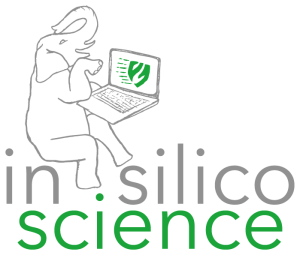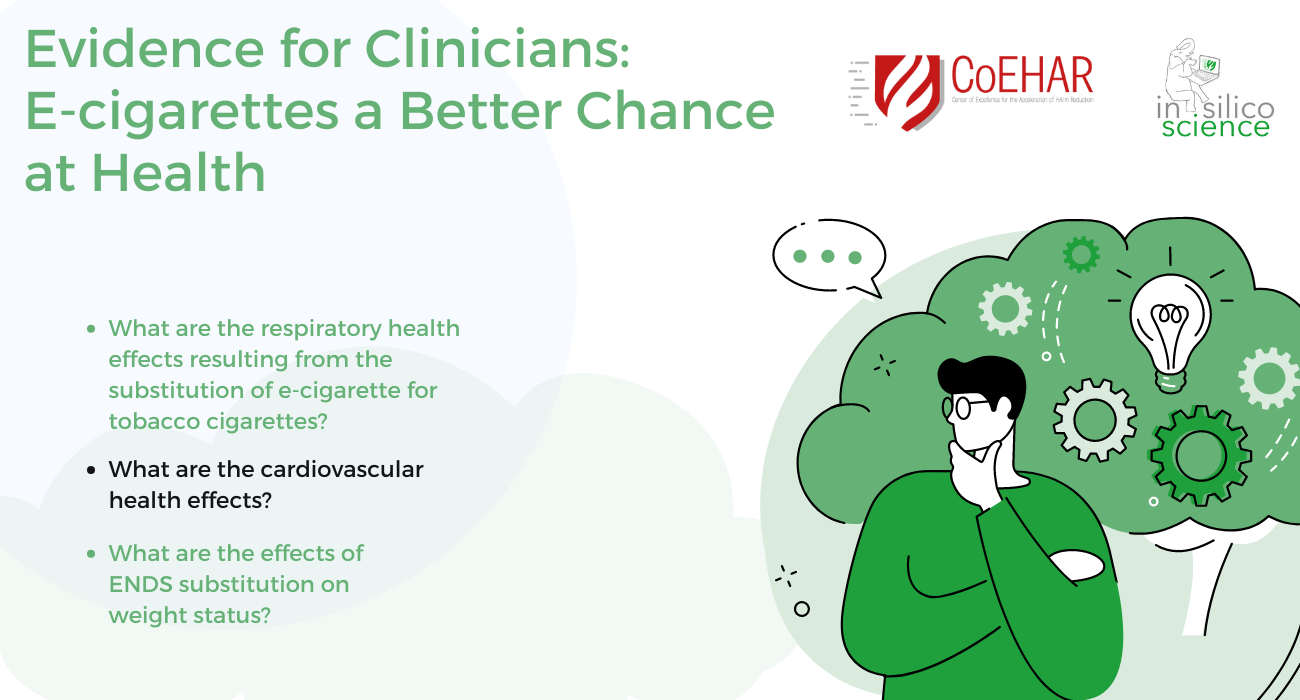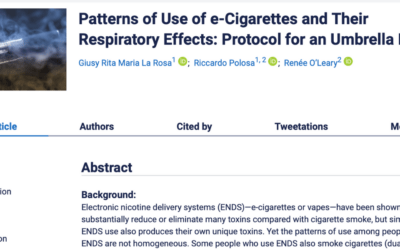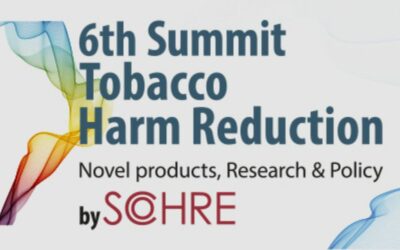In Silico Science
In Silico Science has trained 6 researchers from 6 different countries on innovative methods for living systematic reviews and umbrella reviews applied to the research on tobacco harm reduction, with particular reference to the health effects on cardiovascular and respiratory systems, weight management, COPD, asthma, and smoking cessation

The new highly innovative research project by CoEHAR
This project is producing systematic reviews and umbrella reviews that critically assess the quality of studies, and living reviews and reports in plain language on high quality studies. These reviews aim at providing institutions, healthcare professionals and consumers with reliable and up-to-date data from high-standards studies to inform public health policies.
What is “In Silico Science”? What benefits does it bring?
Healthcare providers and consumers need sound facts and the latest research to inform their decisions about vaping as a substitute for smoking. Unfortunately in the fraught debate over e-cigs, many assertions on the health effects of vaping are based on low quality studies. This project is producing several living systematic reviews and umbrella reviews, together with a plain language summaries of the top quality studies to provide information on the health effects of vaping as a substitution for smoking. The living systematic reviews and umbrella reviews, along with plan language summaries, provide evidence to guide consumers, healthcare professionals, and public health experts.
Consumers
For consumers, the summaries will inform them about the potential benefits and risks of trying substitution.
Healthcare Professionals
For healthcare professionals, the reviews will provide open access to research findings about the health effects of vaping that they may observe in their patients. The reviews will support healthcare providers to make their own determination about substitution as a cessation treatment instead of relying on professional guidelines that are often based on inadequate and out of date information
Public health experts
For public health experts, the reviews will provide data for evidence-informed decisions for treatment protocols and programs, and guidance for research programs.
Renée O' Leary
Renée O’Leary, PhD found her interest in tobacco research in 2006 with the simple observation that tobacco use was the world’s leading cause of death. Since that time, she has focused her research efforts on reducing the harms of cigarette smoking and has specialized in literature review methodologies.
Her Doctorate
She obtained her doctorate in 2018 at the University of Victoria (Canada). Her dissertation, Vapour Products/E-cigarettes: Claims and Evidence encompasses an analysis of e-cigarette regulation, a review of reviews on e-cigarettes and cessation, and a systematic evidence review of youth vaping. A chapter is published as “Claims in Vapour Device Regulation: A Narrative Policy Framework Analysis” (2017, International Journal of Drug Policy). During her doctoral program she led a research project and produced a monograph for the Canadian Institutes of Health Research, Clearing the Air: A Systematic Review on the Harms and Benefits of E-Cigarettes and Vapour Devices.
Her Master's Thesis and other Research
Her Master’s thesis examined the tobacco industry, The Cigarette Commodity Chain and National Tobacco Control in China and Brazil. She is co-author on eight published articles on smoking cessation and on outdoor smoking bans. As well, she has been involved in health-related literature searches on health equity, post-cardiac care, women’s health indicators, domestic violence interventions, and alcohol studies.
Recent Works
1: O’Leary R, La Rosa GRM, Polosa R. Reverse spin bias: preliminary observations of reporting bias in medical systematic reviews. Res Integr Peer Rev. 2026 Jan
9;11(1):1. doi: 10.1186/s41073-025-00185-9. PMID: 41508049; PMCID: PMC12784479.
2: La Rosa GRM, Polosa R, O’Leary R. Effect of E-Cigarette Substitution for Cigarettes on Weight Status: A Systematic Review. Arch Med Res. 2025
Jul;56(5):103211. doi: 10.1016/j.arcmed.2025.103211. Epub 2025 Apr 1. PMID: 40174301.
3: La Rosa GRM, Polosa R, O’Leary R. Patterns of Use of e-Cigarettes and Their Respiratory Effects: A Critical Umbrella Review. Tob Use Insights. 2025 Mar
11;18:1179173X251325421. doi: 10.1177/1179173X251325421. PMID: 40078697; PMCID: PMC11898095.
4: O’Leary R, La Rosa GRM, Polosa R. Examining e-cigarettes as a smoking cessation treatment: A critical umbrella review analysis. Drug Alcohol Depend.
2025 Jan 1;266:112520. doi: 10.1016/j.drugalcdep.2024.112520. Epub 2024 Dec 3.
PMID: 39662357.
5: La Rosa GRM, Polosa R, O’Leary R. Patterns of Use of e-Cigarettes and Their Respiratory Effects: Protocol for an Umbrella Review. JMIR Res Protoc. 2024 Sep
4;13:e60325. doi: 10.2196/60325. PMID: 39230946; PMCID: PMC11411221.
6: Qureshi MA, Vernooij RWM, La Rosa GRM, Polosa R, O’Leary R. Correction to: Respiratory health efects of e-cigarette substitution for tobacco cigarettes: a
systematic review. Harm Reduct J. 2024 Mar 13;21(1):60. doi:
10.1186/s12954-024-00968-1. Erratum for: Harm Reduct J. 2023 Oct 4;20(1):143.
doi: 10.1186/s12954-023-00877-9. PMID: 38481244; PMCID: PMC10935769.
7: Qureshi MA, Vernooij RWM, La Rosa GRM, Polosa R, O’Leary R. Respiratory health effects of e-cigarette substitution for tobacco cigarettes: a systematic
review. Harm Reduct J. 2023 Oct 4;20(1):143. doi: 10.1186/s12954-023-00877-9.
Erratum in: Harm Reduct J. 2024 Mar 13;21(1):60. doi:
10.1186/s12954-024-00968-1. PMID: 37794458; PMCID: PMC10552385.
8: O’Leary R, Rosa GRM, Vernooij R, Polosa R. Correction: Identifying spin bias of nonsignificant findings in biomedical studies. BMC Res Notes. 2023 Aug
24;16(1):183. doi: 10.1186/s13104-023-06441-9. Erratum for: BMC Res Notes. 2023
May 3;16(1):50. doi: 10.1186/s13104-023-06321-2. PMID: 37620934; PMCID:
PMC10464115.
9: O’Leary R, Polosa R. e-Cigarette Use and the Cessation of Tobacco Cigarette Smoking: Protocol for an Umbrella Review. JMIR Res Protoc. 2023 Aug
10;12:e47711. doi: 10.2196/47711. PMID: 37561572; PMCID: PMC10450527.
10: O’Leary R, La Rosa GRM, Vernooij R, Polosa R. Identifying spin bias of nonsignificant findings in biomedical studies. BMC Res Notes. 2023 May
3;16(1):50. doi: 10.1186/s13104-023-06321-2. Erratum in: BMC Res Notes. 2023 Aug
24;16(1):183. doi: 10.1186/s13104-023-06441-9. PMID: 37131244; PMCID:
PMC10155298.

Living Systematic Reviews
While cessation is the ideal outcome for people who smoke, many smokers experience multiple treatment failures, particularly those who have been smoking for decades. Substitution is easier to achieve than abstinence, as demonstrated by decades of research on harm reduction. What health benefits may accrue to people who smoke by switching to vapour products (vaping)? The research challenges with vapour product substitution is that many studies are biased by inadequate research designs, selective reporting, and other critical flaws, and there are an accelerating number of studies being published. Healthcare providers, policy-makers, and consumers need sound facts and the latest research to inform their decisions about vaping as a substitute for smoking.
Methodology for Living Systematic Reviews
A detailed protocol is developed and registered for the reviews. For each review, we formalize rigorous quality standards for inclusion of studies with a Critical Interpretive Synthesis, a method developed in 2006 that critically questions the research problems, study assumptions, factors influencing recommendations, and taken-for-granted concepts found in the literature. With these criteria, the review will progress into a standard systematic review, with one addition: a pre-designed process to keep the review up to date. This emergent systematic review method has been named the Living Systematic Review. These reviews are conducted to PRISMA standards and contain an executive summary and a plain language report. After each review is published, an evidence gap map is charted to produce targeted recommendations for future research.
Primary objective
Publish 3 living systematic reviews and plain language summaries of the top quality studies to provide information on the health effects of vaping as a substitution for smoking in the areas of cardiovascular effects, respiratory effects, and weight management.
Secondary objective(s)
Provide specific recommendations for future research and offer criteria for study design to promote robust evidence on the potential benefits of substitution for tobacco harm reduction.
The Umbrella Reviews
Many clinical studies have investigated vaping and other electronic nicotine-delivery systems (ENDS) for cessation. The 2021 Cochrane review on cessation with ENDS included 61 studies. Consequently, there has been an explosion of systematic reviews on this topic, with 16 published from 2020 to 2022. With so many systematic reviews available, individuals can cherry-pick among the diverging conclusions that support their own position on ENDS.
Objectives
The overarching goal of the Umbrella Review project is to situate the current systematic reviews in the wider discussion of ENDS for cessation in two ways: the quality of the reviews and the clinical data on cessation.
Illuminate the Path
Publish 2 umbrella reviews on high quality scientific journals to show the findings of all the systematic reviews on ENDS for smoking cessation, COPD and asthma
Quality Benchmarking
Recommend, based on an objective and extensive assessment, the best quality systematic reviews and flag substandard reviews.
Quit-rate data
Provide data for ENDS use in smoking cessation and demonstrate the comparative effectiveness to other tools and therapies
Health effects data
Display and synthesize the findings of clinical studies on the effects of ENDS use on COPD and asthma.
Methodology
AMSTAR2 Quality Assessment
Our reviews are assessed with AMSTAR2, one of the most popular measurement instruments and scoring tools for systematic review quality assessment, ensuring trust in our findings.
Bias Mitigation
We proactively identify protocol deviations, data discrepancies, and reporting biases to uphold scientific integrity
Meta-Analytic Strategy
For the clinical data on cessation, the Umbrella Review will perform a meta-analysis of quit rates and a meta-analysis of ENDS effectiveness compared to other cessation treatments. The result of these analyses is a tertiary synthesis of the data available in the systematic reviews.
The umbrella review will synthesize findings from human clinical trials, RCTs, and longitudinal cohort studies. Analysis methods will be selected based on the available datasets. The result of these analyses is a tertiary synthesis of the data available in the systematic reviews. The large number of narrative reviews will be summarized and analyzed for publication bias.
Publications
Reverse spin bias: preliminary observations of reporting bias in medical systematic reviews
Background While conducting an umbrella review of e-cigarettes for smoking cessation, we observed that in many instances, systematic review authors reported findings favorable to the treatment, yet they declined to recommend it or recommended against it despite the...
Effect of E-Cigarette Substitution for Cigarettes on Weight Status: A Systematic Review
Background: The substitution of smoking with electronic nicotine delivery systems (ENDS) is increasingly used as a strategy for tobacco cessation or reduction, and its impact on body weight is a key area of research. Aims: To examine the effects of ENDS on...
Patterns of Use of e-Cigarettes and Their Respiratory Effects: A Critical Umbrella Review
E-cigarettes (ECs) are a well-established consumer product. To study their respiratory health effects, there is the issue of heterogenous patterns of use: concurrently with cigarette smoking (dual use), exclusive use after smoking cessation (exclusive use), or use...
Examining e-cigarettes as a smoking cessation treatment: A critical umbrella review analysis
Introduction This umbrella review identified the current high-quality systematic reviews on e-cigarettes as a smoking cessation aid. What is the comparative effectiveness of e-cigarettes compared to other cessation treatments or approaches? We also investigated the...
Patterns of Use of e-Cigarettes and Their Respiratory Effects: Protocol for an Umbrella Review
Background:Electronic nicotine delivery systems (ENDS)—e-cigarettes or vapes—have been shown to substantially reduce or eliminate many toxins compared with cigarette smoke, but simultaneously ENDS use also produces their own unique toxins. Yet the patterns of use...
Clinical testing of the cardiovascular effects of e-cigarette substitution for smoking: a living systematic review
Some persons who smoke have substituted e-cigarettes for tobacco cigarettes, either completely or partially. What effect does this have on cardiovascular functioning? We conducted a living systematic review on human clinical studies measuring the cardiovascular...
Respiratory health effects of e-cigarette substitution for tobacco cigarettes: a systematic review
Background E-cigarettes (electronic nicotine delivery system, ENDS) have been presented as a harm reduction strategy for people who smoke tobacco cigarettes but who cannot achieve abstinence, or for those who wish to continue to enjoy nicotine and the habit of...
e-Cigarette Use and the Cessation of Tobacco Cigarette Smoking: Protocol for an Umbrella Review
Background: Electronic nicotine delivery systems (ENDS), commonly called e-cigarettes, have been examined in clinical studies for their effects on tobacco smoking cessation. In the past 2 years, a dozen or more systematic reviews on ENDS and cigarette smoking...
Identifying spin bias of nonsignificant findings in biomedical studies
Objective The purpose of this research note is to share a technique for the identification of spin bias that we developed as part of a living systematic review on the cardiovascular testing of e-cigarette substitution for cigarette smoking. While some researchers have...
Respiratory and Cardiovascular Health Effects of e-Cigarette Substitution: Protocol for Two Living Systematic Reviews
Background:Despite the clear risks of tobacco use, millions of people continue to smoke. Electronic nicotine delivery systems (ENDS), commonly called e-cigarettes, have been proposed as a substitute for those who are unwilling or unable to quit. Current systematic and...
Education and Training
Hundred-fifty participants from all over the world took part in the first webinar on “Living systematic reviews: a new standard for medical research questions” to learn the cutting-edge methodologies in developing a Living Systematic Review.
The seminar, held on 16 November 2021 by In Silico Science project leader Dr Renée O’Leary, underlined that LSR provides the up-to-date evidence on medical topics, including THR, that merit consideration for clinical practice
Renée O’Leary, project leader of “In Silico Science”, explains how to integrate the concept of harm reduction in project management: having the wherewithal to use funds correctly, to think the project through is the key to be able to look at possible contingencies and to to assess the value of the project
Daily meetings, technical skills such as quality assessment and bias evaluation and a very specific methodology regarding the field of systematic reviews: Giusy Rita Maria la Rosa talks about her experience during the first year of fellowship under the In Silico Science project at CoEHAR, held from 2020 to 2021.
Working in an highly professional work environment, thanks to the coordination of Dr. O’Leary, gave to Dr. La Rosa the possibility to develop new skills, learning how to deal with an international research project and giving a boost to her career.
Press
A new systematic review by CoEHAR sheds light on the role of ENDS in managing post-cessation weight gain
Catania, April 7, 2025 – Weight gain remains one of the most feared side effects among those who decide to quit smoking. According to consumer opinions and preliminary industry data, reduced-risk products—such as electronic cigarettes—could represent a viable strategy...
New CoEHAR Umbrella review: no significant impact on lung function with E-cigarette use
The study systematically reviewed the respiratory effects of e-cigarette (EC) use, distinguishing between dual use, exclusive use, and naïve use. Twelve systematic reviews were analyzed No significant changes in respiratory function were observed across all patterns...
Umbrella Review: e-cigs are more effective for quitting than all other treatments
A groundbreaking umbrella review conducted by the Center of Excellence for the Acceleration of Harm Reduction (CoEHAR) at the University of Catania sheds new light on the efficacy of e-cigarettes as a smoking cessation aid. Published in Drug and Alcohol Dependence,...
New protocol aims to investigate the impact of different pattern of ENDS use on respiratory effects
CoEHAR researchers published a new protocol for an umbrella review to present all the evidence available on the respiratory effects of ENDS use by adults based on their pattern of use Electronic nicotine delivery systems have now become a well-established choice for...
CoEHAR: NO HEALTH RESPIRATORY EFFECTS REPORTED WITH ECIG SUBSTITUTION FOR SMOKING
A new review conducted on the available scientific literature showed no difference in respiratory parameters in human clinical tests on the respiratory effects of ENDS use in participants who smoke tobacco cigarettes Catania, 8 November, 2023 – The substitution of...
In Silico Science and Replica PI will attend the 6th THR summit, Athens
CoEHAR Director and the PI of the In Silico Science project will join experts, scientists and THR advocates at the 6th Summit on Tobacco Harm Reduction: Novel products, Research & Policy ( 25-26 September, Athens) by SCHORE The 6th Summit on Tobacco Harm...








